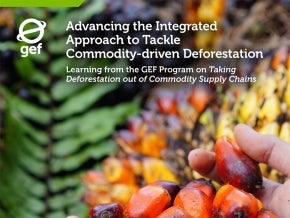
Forests_Banner_5.jpg
At the dawn of the UN Climate Summit in New York that anticipates high-level endorsements of the New York Declaration on Forests, the Global Environment Facility (GEF) is fully prepared to provide strengthened support for forests on a global scale.
Global action on forests is crucial to maintain forest resources and ecosystems. But maintenance is simply not enough. Forests have been neglected in ecosystem restoration efforts and enhancement of forest management. These issues are difficult to tackle without boosting regional and global cooperation on forests.
These objectives - to maintain, restore, enhance forest management, and increase regional and global co-operation - are key in the new GEF-6 Sustainable Forest Management Strategy to achieve multiple environmental benefits from improved management of all types of forests. The strategy accounts for pristine forests, managed forests, and degraded forestland under all forms of ownership, tenure, and use regimes including public, private, community, and traditional or customary arrangements.
Forests’ role in sustaining biodiversity, providing key environmental services, and contributing to many countries’ sustainable development plans is tremendous. Yet, the planet loses over 50,000 square miles of forest per year.

Forest%20CR%20page.jpg
Governments recognize both the significance of forests and the deforestation issue. They also face a range of economic, ecological, and political choices in achieving sustainable forest management (SFM).
“Until we change the way forests are used to derive economic benefits, deforestation will continue to drive species to extinction 1,000 times faster than the norm, and will continue adding a heavy load of greenhouse gases into our atmosphere,” says Gustavo Fonseca, GEF Director of Programs. “Despite ongoing efforts … we need to do a better job of finding ways to generate wealth and feed a growing human population without undermining the ecological foundation that has enabled our species to become the dominant force over the entire planet.”[1]
Today, avoiding deforestation, changing unsustainable practices, and restoring degraded forestland are major challenges that many countries with forest resources face.
To achieve the sustainable flow of multiple forest goods and ecosystem services, governments must address these challenges simultaneously. Such efforts need to take into account countries’ varying development pathways, their technical and institutional capacity, and the extent and type of forest resources with which they are endowed.
The GEF-6 SFM Strategy is a practical instrument to help governments overcome these hurdles. The strategy is based on an incentive program designed to help countries to maintain, restore, and manage their forests more sustainably.
In 2014-2018, the GEF will encourage countries to utilize over $700 million of its resources to tackle the drivers of deforestation and forest degradation, supporting forests’ role in national and local sustainable development plans.
To make better management of 20 million hectares of forest landscapes a reality within the next four years, the strategy also targets key global drivers of deforestation through Taking Deforestation out of Commodity Supply Chain, a brand new $45-million integrated program.
This program harnesses the growing public and private sector interest in sustainable commodities to spur transformational change to supply palm oil, soy, and beef without deforestation.
“Understanding what drives deforestation is not rocket science. It's basic economics,” Fonseca underscores. “Woefully undervalued woodlands are giving way to agricultural use, estimated to be responsible for 80 percent of deforestation worldwide. Much of the pressure on standing forests comes from … soy, palm oil, beef, pulp, and paper.”
GEF’s take on forests is fully aligned with current global efforts that approach the issue in a holistic manner –recognizing the links between poverty alleviation and sustainable management of forest resources.
The GEF’s unique position to aid countries’ implementation of the three Rio Conventions[2] backstops its ambition to achieve multiple environmental benefits and services that forests provide. To maintain them, the GEF also actively cooperates with the United Nations Forum on Forests on a range of the issue related topics.
[1] See Gustavo Fonseca’s Blog: You Can't Eat Your Cake and Have the Forest Too -- or Can You?
[2] The three Rio Conventions are the UN Convention on Biological Diversity, the UN Framework Convention on Climate Change, and the UN Convention to Combat Desertification.

